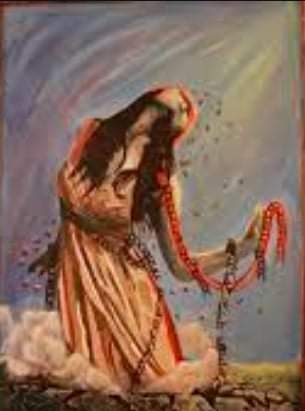

The dream of a young married woman ended in a moment when she wanted to go on a visit in order to check on her life partner. Little did she know this would be a sin. The question whether it is or not had no meaning anymore, and the answer is not even useful now as her soul has ascended into heaven.
She is Rabab Qaid, 25 years old, from the village of Al-Saidia in the Al-Khokha district of Al-Hodeidah Governorate. She has been married to the detainee and community activist Naji Muhammad Suleiman Massas since 2008.
On the morning of Wednesday, June 28, 2017, Rabab's husband was kidnapped by men affiliated with Houthi-run Political Security Organization while he was doing his humanitarian work.
Naji says: "That morning, I received a call from one of my acquaintances, telling me that a businessman had 90 food baskets that would be distributed to IDPs of Mocha, and I had to go from the village of Saidia to the city of Hais. When I reached the exact location, I called this person. He replied that he was in the market. Once I hung up the call, a car stopped next to me, and they asked me to ride. When I got in the car, they took my phone and said that they were members of the Political Security and they were asked to arrest me. Then they took me to Hodeidah.
Naji spent about 50 days in his detention center in Hodeidah, after which he was transferred to a detention center in Sana’a governorate while his wife knocked at every door looking for him. She lost a lot of money in order to know his fate but to no avail.
After about 11 months in detention, he was allowed to call his wife without being allowed to reveal his whereabouts, but his wife realized he was detained.
Naji adds: "After two months of the previous call, I was allowed to communicate for a period not exceeding five minutes only. Then Rabab asked me about the possibility of visiting me, and I told her that this became permissible, but due to the distance and hardship of travel, I don’t want you to visit me."
Nevertheless, his wife, Rabab, insisted on visiting him even if the distances are long as she will bear the hardship of traveling in order to visit him and look at his face. It was a duty she willingly wanted to fulfill.
Rabab prepared herself for travel. She baked cakes and cookies. Then she left her home in the village of Saidia, Khokha district, accompanied by her cousin who is also her sister's husband, Muhammad Hanbalah, a 30 year- old man, and her nephew Maeen Muhammad on the morning of July 24, 2018.
Pleasure and joy surrounded Rabab from all sides as she was going to meet her life partner who had been absent for a year. She imagined the moments when she looked at her imprisoned husband as the agony of longing and estrangement overwhelmed her, unaware of what her destiny was.
As soon as she set her feet to reach the city, Rabab headed towards the city of Hais, seven kilometers from her village, and after five kilometers from the city of Hais, and at the Wadi Dhami Bridge, the hope of the connection she was seeking vanished. A landmine, planted by the Houthi group that passed through there, exploded in them. Her cousin Muhammad Ali died at once whereas Maeen Muhammad was injured, so the Houthis took him to a place close to them. As for Rabab, a passerby recognized her during his return from Hais and informed the Houthis that he knew her father, so they called Rabab’s father, Qaid Muhammad Ahmed Massas al-Bishri, who joined her, yet the Houthis did not allow her to be rescued to the city of Hais, which was close to the accident, or to Al-Khokha since they are areas under the control of the legitimate government.
Rabab was finally taken to Al-Qaeda city in Ibb governorate, then to Sana’a governorate. The road was bumpy, and the distance was very long, during which Rabab bled a lot until she reached a hospital in Sana’a. After five days of being injured and resisting the pain of separation and wounds, she passed away.
Naji eagerly waited for his wife but in vain. Also, the prison administration would not allow him to communicate except according to their mood and at the time specified by them.
A month had passed since Rabab's death while Naji didn’t know until the prison administration allowed the detainees to call. Naji called Rabab, but her phone was switched off, so he called her father's phone, which was also switched off.
Naji continues: "I remembered my neighbor's phone, and he was the one who told me the details, so I took her father and mother's phone numbers from him because the previous number was stolen by the Houthis, and I called them to offer condolences and share their grief."
Naji had remained in detention before he was released on October 16, 2020, as part of a swap deal between the legitimate government and the Houthis under the auspices of the International Committee of the Red Cross.
When Naji was released, Rabab left him only a few words that she sent him with her brother moments before her death: "If you were lucky enough to visit Naji, kiss him twice on the cheek and tell him to marry and to paint for himself the most beautiful moments of life, for tomorrow still holds a lot for him”
As if she was addressing Naji, she said: "You are not in a state of collapse; on the contrary, you are at the beginning of life where the future opens up in front of you. These ordeals create great men like you.”